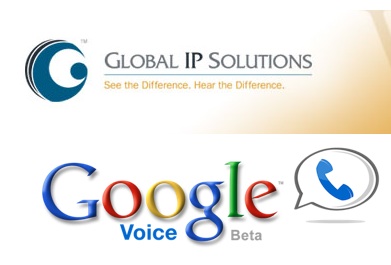
On Friday, Search Engine Watch’s Jonathan Allen posed a question to me about the meaning of Google’s recent acquisitions of voice over IP technology providers. These includes On2, November’s acquisition of Gizmo5 for $30 million, and last month’s Global IP Solutions purchase.
This could mean lots of things on both desktop and mobile environments. For mobile, I might think Google was integrating VoIP capabilities to further sidestep carrier control on Android phones. But recently folding up the NexusOne store makes me think Google sees a losing battle there. Along these lines, Google announced last week that the latest version of Android (froyo) will allow tethering, but once again, carriers will have a say on where and when it works.
Also along the lines of Google mobile initiatives that this might not affect: Google has been doing some interesting things with mobile pay per call but I’m not sure VoIP capabilities are considerably additive. Meanwhile there are suggestions that this will integrate with and improve Google Voice, though Google Voice operates mostly under PSTN and wireless networks rather than VoIP.
So any implications this has for mobile could instead involve more enhanced non-voice communications. In other words, Google could be building a foundation for better voice and video chat on Android handsets. Global IP Solutions (latest acquisition) has publicly stated in the past that it’s working on something like this and already powers enhanced IM capabilities (desktop) for Yahoo and AOL.
Regarding desktop implications, Google could be making a play at improving abilities for users to place calls directly from SERPs. It has experimented with this in the past but it wasn’t a very user-friendly scenario (enter your phone number and Google calls you to connect to the number you clicked on). Better VoIP capabilities could make that a more seamless experience.
But more importantly, it can close the gap in analytics between search and the telephone. Lots of searches (especially local searches) end in a phone conversion rather than a click. It’s hard for Google to get “credit” for driving that lead to an advertiser, or prove effectiveness/ROI in search spend, as it can with clicks. Note that phone numbers are provided in 7 pack listings without having to click anything.
Skype has already begun to do this in a clever way by hyperlinking local phone numbers that show up in the 7 pack and driving calls to local businesses (leads resold through Yellow pages partners). I’ve thought of that as a Trojan Horse into the coveted 7 pack inventory, and I’m sure Google didn’t like that.
Google could be doing something similar to reclaim that territory and more effectively drive (and track) calls in addition to clicks.
This Post Has One Comment
Leave a Reply
You must be logged in to post a comment.

Everybody in the industry says that Google wants to control the core VoIP technology. Its bid for GIPS makes much sense in this respect. But what it means for the customers of GIPS, and some of them, by the way, are in direct competition with Google. It’s not unlikely they will be left with
limited or no support at all. Google will use VoIP as a platform in its Android OS, Google Chrome and probably in its Google Apps. Google will need GIPS’ expertise and engineering resource to back its VoIP strategies. SPIRIT DSP which successfully competed with GIPS over all these years is now the only independent VoIP technology company on the market. SPIRIT dislodged GIPS from Skype and was named among the Top 10 VoIP leaders by FierceVoIP. Today SPIRIT offers its VVoIP platform on a
variety of desktop and mobile platforms, supporting not only Google’s Android but iPhone,Symbian, Windows Mobile. SPIRIT offers a video server with 1000-channel capacity. Now SPIRIT is the number one choice for service providers, application developers, and telcos that are
deploying voice and video communication services.